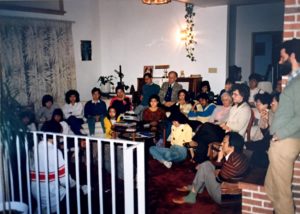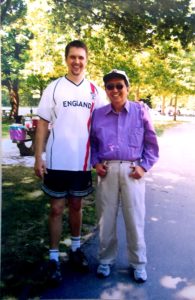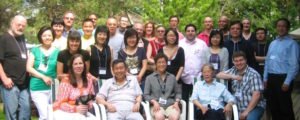Dr. Paul T. P. Wong’s autobiography, A Lifelong Search for Meaning: Lessons on Virtue, Grit, and Faith, is published in weekly installments. Stay updated here.
I have both benefited and suffered a great deal from the church (see Ch. 18, Ch. 19). For two years, I stopped going to Sunday services altogether, utterly disillusioned with the growing irrelevancy of organized Christianity. With so many opportunities around us and potential resources available for growth and impacting society, yet most of the churches we had attended still played the shallow church game revolving around the Sunday worship service.
During those two years, we seriously considered alternative ways of home-based meetings, modelling after my friend Ross Rains’ Pathfinders Fellowships.

My friend Ross Rains
Ross used to be my partner in campus ministry at Trent University, when he was a staff member of Navigators Canada, of which he later became the national director. Thus, his Pathfinders are built on his experience in discipleship training with a focus on sharing the love of Christ at the local community level. In their words, “We do this through winning, discipling, and equipping people in simple fellowship settings… it might be in a home, in a business venue, or among an affinity group of friends who enjoy sports or other activities together. Some call it ‘simple church’ or ‘organic church.’” Their vision is “to advance the Gospel through oikos practitioners, households of faith, who live among the lost and make disciples.” I believe that his approach can complement but not replace the traditional church.
I am also familiar with the local church movement started by Watchman Nee and expanded by Witness Lee in Taiwan, where my sister-in-law Shui Lu (Ch. 6) is an influential elder. The local church is like a cell church where all meetings are held at homes and led by trained elders. This movement is controversial because it is opposed to the clergy-laity system and all denominations.
During those days when I did not attend any church, my wife and I still worshiped virtually by watching Sunday worship services on TV and tried to meet our needs for fellowship through home-based small groups. However, I have always believed that God is bigger than the organized church and that He is still able to use the church, in spite of its imperfections, to establish His kingdom on earth. As Os Guinness points out in his book Impossible People (2016), the church still has the important task of engaging secularism and atheism in new ways and proclaiming the Gospel of Christ with courage and integrity.
On a personal level, my most productive and happiest days of Christian service have been outside of the “box” (Ch. 19), but on balance and considering the overall Christian landscape, I am compelled to conclude that, realistically, most of Christian ministry still needs to be carried out within an organized church. The upshot of all these inner struggles was that I finally decided to join a church; thus, my wife and I have been attending Grace Chinese Gospel Church of North York since September 2016.
My Vision of the Ideal Church
The focus of this chapter is to share my vision of the ideal church; this vision is shaped by my study of the Bible and my accumulated church experiences, both good and bad, so that my learning is not wasted. According to this vision, the ideal church functions as a loving family, a caring hospital, a vigorous school, and a compassionate mission. Thus, the church meets four fundamental spiritual human needs: love, healing, growth, and service.

The Reformer Martin Luther
Perhaps the best way to understand Protestant churches is to begin with Martin Luther. The first part of Martin Luther’s Reformation was doctrinal—we are saved by grace through faith, not by good works, as taught by the Word. The second part of his Reformation was practical—we are saved to do the good works of loving God and loving people, as taught by the Word Incarnate. Put another way, faith and good works are two sides of the same coin; after all, faith without works is dead (Jam. 2: 17).
The main weakness of evangelical Christian churches is their overemphasis on salvation by faith alone and eternal security, and a lack of emphasis on Christian practice in everyday life. Unfortunately, many Christians have lost the heart and soul of their faith by focusing on church attendance rather than loving God and loving people on a daily basis.
A proper understanding of the Reformation is that, since we are justified by faith and there is no need to earn our salvation through good works, we should devote our energy to loving God and loving people. In other words, we are saved for the purpose of doing good works and bringing heaven to earth. The church will become more relevant when it carries out the second part of the Reformation of practicing Gospel-driven love.
The Church as a Loving Family
First and foremost, the church should be a spiritual home, a loving family of believers. In a world full of conflicts, mistrust, and cutthroat competition, the church should stand in stark contrast as a place governed by love, as described in the famed passage of 1 Corinthians 13:4-8:
Love is patient, love is kind. It does not envy, it does not boast, it is not proud. It does not dishonor others, it is not self-seeking, it is not easily angered, it keeps no record of wrongs. Love does not delight in evil but rejoices with the truth. It always protects, always trusts, always hopes, always perseveres. Love never fails. But where there are prophecies, they will cease; where there are tongues, they will be stilled; where there is knowledge, it will pass away.
Throughout his earthly ministry, Christ called his disciples to love one another: “A new commandment I give you: Love one another. As I have loved you, so also you must love one another. By this, all men will know that you are My disciples, if you love one another” (John 13:34-35).

Three generations gathering together on Friday night for PCCF
Regardless of the size of the church, if it is full of God’s love, visitors can sense its warmth and friendliness as soon as they step into the door. However, small churches are more likely to create the atmosphere of a loving family, as shown in this photo. While we were in Peterborough, on a typical Friday evening, around 40 people from youths to seniors would get together at our home for fellowship and Bible study. Numerous church leaders and missionaries have emerged from what we called the Peterborough Chinese Christian Fellowship (PCCF). Many students still have sweet memories of the meetings in our home.
Many churches, including Grace Chinese Gospel Church, have caught the vision of being a cell-based church, as articulated by Ralph Neighbour (2000). A pioneer in the cell church movement, he believed that the cell group is not just a part of church life, but all of church life. When the home-based cell group functions properly, as described in Acts 2:41-47, “all other competing structures are neither needed nor valid” (p. 131).
Joel Comiskey (2012) also believed that the first-century house church strategy can be applied to the 21st century. He explained that both evangelism and leadership training can be developed naturally in a home setting when each cell member joins together to do the work of the ministry (Eph. 4:11-13) within the context of covenant relationships. Thus, the tasks of edification, equipping, evangelism, and leadership training can all be achieved in cell groups, as we have demonstrated in PCCF. This is possible only when cell members have the opportunity for training and utilizing their spiritual gifts.
In his book, Life Together (1978), Dietrich Bonhoeffer opened with the quote from Psalms 133:1, “Behold how good and how pleasant it is for brethren to dwell together in unity.” He believed that the church should function as a living and vibrant organism, a “community of love” as described in the book of Acts. In a community of love, members share their lives openly, are willing to be vulnerable, and accept each other with unconditional positive regard. God creates the church so that people can experience love through their relationship with Christ and with one another. In a cold and heartless world, this meets people’s deepest needs to love and be loved.
Bonhoeffer emphasized that the focus of this community should be Christ. Elsewhere, I have described in more detail how cell group members can care for each other and minister to each other for the purpose of becoming transformed to the image of Christ (Wong, 2017). We become the salt and light in this dark world only when we carry the fragrance of Christ.
The Church as a Caring Hospital

God knows
The mentality that God knows and that He will take care of all our problems may contribute to some Christians’ mental health problems in two ways. First, it prevents them from seeking professional help. Second, it prevents them from taking personal responsibility to understand the cause of their predicaments and make necessary changes.
Years ago, I was struck by a statement in Luis Palau’s book Changed by Faith: Dare to Trust God with Your Broken Pieces (2011). He compared the church to a “garbage can” because God can transform all kinds of broken and damaged people into something beautiful. The problem is that this process of transformation may take many years.
My experiences as a church member and a clinician have confirmed that the church has a greater collection of damaged people than any other human institution. Given the phenomenon that hurt people tend to hurt others, abuse often takes place within the church.
When I started teaching at Trinity Western University, I organized an international conference on the topic of, “What is Spiritual Abuse, and What Can We Do About It?” It is sad that people are more likely to be abused within the church than outside the church. Abuse can take place between church members; church members can abuse their pastor, as I have described in Chapter 18; and pastors can also abuse their members, as described in Chapter 19.
The National Association of Christian Recovery has defined various kinds of spiritual abuse. It is not difficult to understand that, when people are associated with each other at an intimate level as in a marriage or a family, the likelihood of hurting each other psychologically is great. A community of love is by nature a healing community, because redemptive love always leads to healing and wholeness. That is why I wrote an article on church as a healing community when I was teaching at Tyndale University College and Seminary (Wong, 2008).
At the heart of my article, I argued that, just as Christ was wounded for our healing, so we too should be willing to be wounded for others in Christian ministry. The pastor serves as a model of a wounded healer made whole: “Only pastors are in a position to cultivate and maintain a ‘healing climate’ through worship services, teaching, small groups, servant leadership, one-on-one counselling, and more importantly, through providing a safe, trusting, and caring environment” (Wong, 2008, p. 11). The church as a healing community will share God’s grace and redemptive love with all hurting people; it will enrich our own lives and make the world a better place.
The Church as a Vigorous School
Having been among Buddhists for many years, I can speak with some confidence that, on average, they are better taught and more consistent practitioners in Buddhism than Christians are in Christianity. I have seen many willing and happy Buddhist volunteers in all sorts of events and projects. Most of them have a clear understanding of the four Noble Truths that (1) life is full of suffering, (2) the cause of suffering is ignorance, (3) there is a way out of suffering, and (4) the way out of suffering is the Eightfold Noble Path.
Furthermore, they not only understand the Eightfold Noble Path, but practice it daily. This consists of right view, right determination, right speech, right conduct, right livelihood, right effort, right mindfulness, and right meditation or concentration. They practice Dharma in order to develop the Buddha-nature (Chan, 2001). The success of Buddhist teaching can be attributed to the fact that their focus is not on large weekly congregational worship services, but on small group teaching and daily practice of the Dharma.
In contrast, most Christian churches are satisfied if their members show up on Sunday. There is little systematic teaching on Christian practices or practical spirituality. They no longer need to keep the Ten Commandments (Exo. 20: 2-17) for salvation, but aren’t we saved so that we can keep the greatest commandments of loving God and loving our neighbours (Matt. 22:35-40)?
Most Christians do not know how to practice Christian spirituality daily. No wonder you can no longer tell the difference between Christians and non-Christians outside the church building. That is why when I was in Vancouver about 15 years ago, I shared this concern with a pastor of a major church. We decided to invite all the pastors in the Greater Vancouver Area to meet with us and plan to develop systematic teaching materials on Christian beliefs and practices.

With Pastor Dean Davey at a church picnic
The response was very disappointing. Only one young pastor named Dean Davey showed up, who later asked me to mentor him. At that time, he was a rising star within the B.C. Fellowship Baptists and eager to learn more from me. Since then, we have worked together to develop best practices in servant leadership. Even today, we are still connected, working on a book about the fivefold path to practical spirituality, which was originally developed in July 2007. I was able to do the exercise described in this paper during my hospitalization post-cancer operation in November 2007. Currently, I am still practicing it for my spiritual and physical wellbeing.
I have developed another line of teaching on the meaning-centered life as a follow-up to the Alpha Course. My course is similar to Rick Warren’s Purpose-Driven Life (2002) but broader, incorporating the positive psychology of happiness and flourishing.
This course was later expanded and adapted to serve the general public through the Toronto Meaningful Living Meetup Group. Hundreds of people have participated in this training. Some have become Christians as a result. The materials used for the group can be found on www.inpm.org. Some of these materials have been adopted and used for life education, correctional services, addiction recovery, and palliative care.

The Toronto Meaningful Living Meetup Group in our backyard on Victoria Day.
My larger vision of Christian education is broader than a Bible-centered, church-based discipleship training; it deals with every major aspect of life from a Christian perspective and helps individuals to overcome their problems (1 John 1: 8-10) and live a fulfilling, abundant life (John 10:10). I wish that there were more pastors like Dean Davey, willing to work with me and develop Christian education materials.
Ideally, a well-educated Christian should pass these four tests:
- Biblical literacy: General biblical knowledge and remembering key Bible verses.
- Theological competence: Understanding the basic Christian doctrines.
- Historical knowledge: Knowing our roots, such as the Reformation and the history of our own local church.
- Practical spirituality: Practicing the spirituality of loving each other and serving God on a daily basis.
The Church as a Compassionate Mission
When we have experienced love and healing within a church family, when we have been properly taught in Christian beliefs and practices, it is only inevitable that we will become ambassadors for Christ (2 Cor. 5:20) and effective agents of social change.
When I was in Vancouver 12 years ago, I attended early morning church prayer meetings. There were only about eight people in attendance. After the prayer meeting, a middle-aged brother approached me and asked me, “Are you saved?” I could only roll my eyes and shake my head in disbelief. If I were not a Christian, how could I attend early morning prayer meetings and pray to God in Christ’s name? I could only draw two conclusions from this instance: First, he thought that I must be a pagan, because I came from China. Second, to him, the only way to witness for Christ was to confront people with the question, “Are you saved?”
That is definitely not my understanding of the biblical way of witnessing. St. Francis of Assisi has been quoted as saying, “Preach the Gospel at all times. Use words if necessary.” When we live the gospel way of love, we become an open letter read by all (2 Cor. 3:2).
To me, the most complete statement of the great commission from Christ is in John 20:21: “Again Jesus said, ‘Peace be with you! As the Father has sent me, I am sending you.’” We are called by God to do what Christ did while he was on earth. Luke 4:16-21 provides a good description of his compassionate ministry:
He went to Nazareth, where he had been brought up, and on the Sabbath day he went into the synagogue, as was his custom. He stood up to read, and the scroll of the prophet Isaiah was handed to him. Unrolling it, he found the place where it is written: “The Spirit of the Lord is on me, because he has anointed me to proclaim good news to the poor. He has sent me to proclaim freedom for the prisoners and recovery of sight for the blind, to set the oppressed free, to proclaim the year of the Lord’s favor.” Then he rolled up the scroll, gave it back to the attendant and sat down. The eyes of everyone in the synagogue were fastened on him. He began by saying to them, “Today this scripture is fulfilled in your hearing.”
We all have different spiritual gifts and different trainings, but we are all called by God to be conformed to the image of Christ and then go the world to share God’s love. This is the purpose and mission of a biblical church. Elsewhere, I have provided a more detailed description of the characteristics of missional Christians (Wong, 2012):
- They are spirit-led. They are not afraid to step out of bounds and live on the edge. They go where the Spirit leads and flow like wind sent from the heart of God.
- People are more important than programs. Missional leaders invest in other people’s lives and help develop them to be God’s instruments of grace. Nothing is more exciting than transforming lives. To be missional is more than to engage in an evangelistic or missionary program. It is a way of life around God’s mission in this world. Missional leaders dare to go wherever God leads in order to be the change that impacts the world.
- They see the church differently. The true nature of the church is the coming together of those called by God to share, celebrate, and participate in extending God’s reign.
- They see themselves as ordinary people rather than professional clergy. They consider themselves as slaves saved to serve the Lord, repaired to reclaim the lost, and called to co-create something beautiful in the midst of miseries.
- Every ordinary believer can become a missional leader. Whoever listens to God and obeys God’s calling can be trained to become a missional leader. With the help and support of the community, they can do something meaningful and significant.
- They are incarnational rather than promotional. They think missionally and live incarnationally on a daily basis. They are more concerned about being than doing.
I have also shared my view on how to get our church members actively engaged in church ministry. The key to achieving this goal is that each cell group should be a work group (see Tit. 3:14; Eph. 2:10, 4:11-13).
Conclusion
My last word for all my Christian friends is this: Let’s stop doing church—let’s be the church. Let’s focus on developing people rather than programs. Let’s start with the most basic spiritual practice of showing empathy, kindness, and gratitude to people we meet inside and outside the church.
A few days ago, I shared Chapter 18 with a brother from TCGC and told him that the fake history of the Toronto Chinese Gospel Church has caused me a great deal of pain. His answer was, “It does not matter who started the Chinese Gospel Church, because it does not concern me.”
Does it matter when another brother or sister feels hurt? What should be the Christian response to my predicament? Aren’t we all members of the same body? The Bible has clearly said, “If one part suffers, every part suffers with it” (1 Cor. 12:26). The Bible has also instructed us to “carry each other’s burdens, and in this way you will fulfill the law of Christ” (Gal. 2:6).
God has called us out from the world to be a special people. Therefore, let us feel each other’s pain and greet each other with kindness and joy. Let us encourage each other in our daily struggle against the dark forces of the world and extending the kingdom of God on earth. I want to end this chapter with Psalm 147:1-3:
Praise the LORD. How good it is to sing praises to our God, how pleasant and fitting to praise him! The Lord builds up Jerusalem; he gathers the exiles of Israel. He heals the broken hearted and binds up their wounds.
References
- Bonhoeffer, D. (1978). Life together: The classic exploration of Christian community. San Francisco, CA: HarperOne.
- Chan, Master S.-Y. (2001). Zen wisdom: Conversations on Buddhism. Berkeley, CA: North Atlantic Books.
- Comiskey, J. (2012). Biblical foundations for the cell-based church: New Testament insights for the 21st century church. Moreno Valley, CA: CCS.
- Guinness, O. (2016). Impossible people: Christian courage and the struggle for the soul of civilization. Downers Grove, IL: IVP Books.
- Neighbour, R. (2000). Where do we go from here? (10th anniv. ed.). Houston, TX: Touch Outreach Ministries.
- Palau, L. (2011). Changed by faith: Dare to trust God with your broken pieces. Carol Stream, IL: Tyndale Momentum.
- Warren, R. (2002). The purpose driven life: What on earth am I here for? Grand Rapids, MI: Zondervan.
- Wong, P. T. P. (2007). A fivefold path to practical spirituality. International Network on Personal Meaning. Retrieved from http://www.meaning.ca/archives/archive/art_PSPG_intro-5fold-path_P_Wong.htm
- Wong, P. T. P. (2008). Renewing the church as a healing community. Tyndale Connection, 14(2), 10-11.
- Wong, P. T. P. (2012). How best to prepare missional leaders. In P. Au (Ed)., Glorious ministry: A festschrift dedicated to Rev. Dr. John Kao (pp. 263-267). Toronto, ON: Association of Canadian Chinese Theological Education.
- Wong, P. T. P. (2017, November 29). Lessons on Christian ministry and cell groups. Dr. Paul T. P. Wong. Retrieved from http://www.drpaulwong.com/lessons-on-christian-ministry-and-cell-groups
